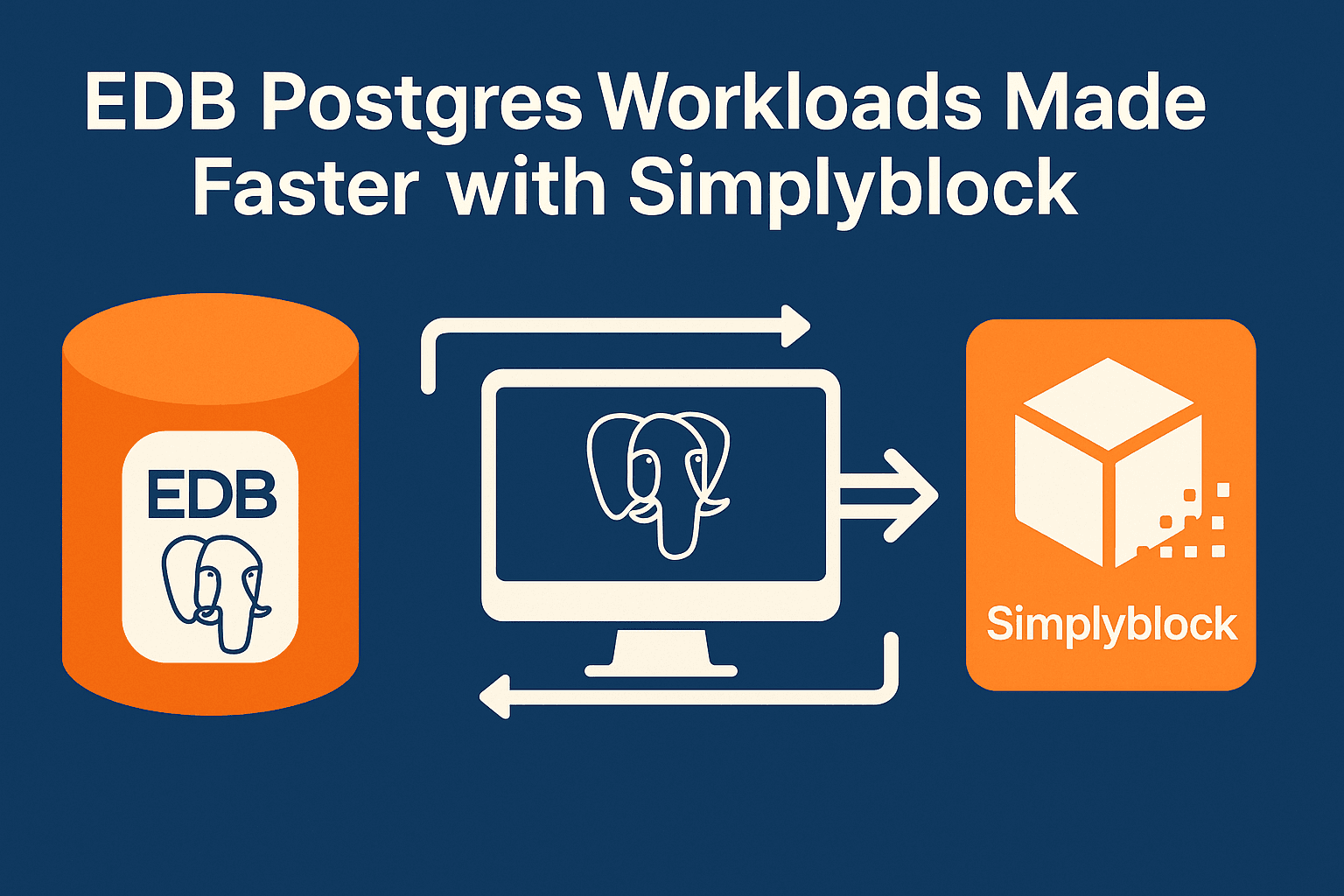EDB Postgres extends PostgreSQL with advanced enterprise features, making it a strong choice for business-critical applications. However, as data grows, storage performance becomes a deciding factor in keeping systems reliable and scalable. Traditional systems often fall short when handling large datasets, leading to performance slowdowns and scaling challenges.
Simplyblock solves these issues with NVMe-over-TCP storage and a zone-independent design. It provides the speed, flexibility, and resilience that EDB Postgres needs to keep pace with enterprise workloads. By pairing the two, organizations can run data-intensive applications with improved reliability and simplified operations.
The Link Between Storage Stability and EDB Postgres Efficiency
EDB Postgres is designed to deliver high performance for transactional and analytical tasks, but the efficiency of its underlying storage determines how well it performs at scale. Without optimized storage, slow I/O operations, replication delays, and longer query execution times can affect production environments. Simplyblock eliminates these bottlenecks with high-throughput storage that supports zone independence and rapid scaling.
This ensures EDB Postgres runs smoothly across both OLTP and OLAP workloads while directly supporting database performance optimization. It also helps database teams meet service-level agreements by maintaining predictable response times, even under heavy load.
🚀 Scale EDB Postgres with High-Performance Storage
Use simplyblock to expand storage seamlessly and keep enterprise workloads running without downtime.
👉 Use simplyblock for EDB Postgres Scaling →
Step 1: Provisioning Simplyblock Volumes for EDB Postgres
Create and connect a simplyblock volume to store EDB Postgres data:
sbctl pool create edb-pool /dev/nvme0n1
sbctl volume add edb-postgres-data 200G edb-pool
sbctl volume connect edb-postgres-data
Then format and mount the volume:
mkfs.ext4 /dev/nvme0n1
mkdir -p /var/lib/edbpostgres
mount /dev/nvme0n1 /var/lib/edbpostgres
Finally, update /etc/fstab to make the mount persistent:
/dev/nvme0n1 /var/lib/edbpostgres ext4 defaults 0 0
These steps ensure that the database is backed by high-performance storage right from the start. Once in place, administrators can rely on simplyblock for consistent speed across transactions and queries.

Step 2: Configuring EDB Postgres for Simplyblock Storage
Point EDB Postgres to use the new simplyblock volume by updating the storage path:
export PGDATA=/var/lib/edbpostgres
Restart the EDB Postgres service to apply the new configuration:
sudo systemctl restart edb-as
This ensures the database writes directly to simplyblock’s optimized storage. For advanced tuning, refer to the EDB Postgres documentation on memory, parallel queries, and replication settings.
With these adjustments, EDB Postgres can handle more demanding workloads while avoiding resource contention.
Step 3: Expanding EDB Postgres Storage Without Downtime
As datasets increase, storage needs to grow without interrupting services. Simplyblock allows seamless resizing of volumes while EDB Postgres stays online:
sbctl volume resize edb-postgres-data 400G
resize2fs /dev/nvme0n1
This makes it possible to scale storage quickly, avoiding the disruptions of manual migrations or downtime. A simplyblock architecture based on software-defined storage ensures flexibility during these expansions.
Database teams benefit by reducing operational overhead while keeping systems ready for future growth.
Step 4: Strengthening EDB Postgres with Multi-Zone Availability
EDB Postgres deployments benefit from high availability, but standard storage often limits cross-zone resilience. Simplyblock addresses this issue with zone-independent volumes that remain accessible during rescheduling or failover, aligning with multi-availability zone disaster recovery.
With this setup, workloads continue to run even if one zone experiences disruption. This design gives enterprises the confidence to operate critical applications without service interruptions. It also simplifies disaster recovery planning by ensuring that storage does not become a single point of failure.
Step 5: Building an Enterprise-Grade EDB Postgres Cluster
In clusters, EDB Postgres benefits from shared, replicated volumes that reduce RPO and RTO. For reference on core admin operations and parameters, refer to the EDB Postgres reference guide.
By extending storage across zones, simplyblock simplifies cluster recovery during outages. This allows database teams to deliver strong resilience while reducing manual intervention during failovers. Over time, this approach supports better business continuity strategies for large enterprise environments.
Enterprise-Scale Storage for EDB Postgres
Scaling EDB Postgres across regions or clouds requires streamlined storage management. Simplyblock’s cloud-native CLI commands make provisioning and maintenance easier, enabling robust hybrid multi-cloud storage.
Enterprises gain the ability to grow storage capacity as needed without complex reconfiguration. This approach ensures predictable performance even as workloads expand globally. It also provides flexibility for hybrid deployments where databases run across different cloud providers or on-premise data centers.
Other supported platforms
If you’re running relational or transactional database workloads alongside EDB Postgres, Simplyblock also strengthens storage for:
Questions and Answers
Simplyblock uses NVMe over TCP to reduce latency and boost IOPS, enabling EDB Postgres to handle write-intensive operations and complex queries more efficiently. This results in faster transactions, better concurrency, and improved overall database responsiveness.
Absolutely. Simplyblock supports stateful workloads on Kubernetes, making it easy to deploy EDB Postgres with persistent, encrypted, and high-performance NVMe volumes that scale with your cluster.
You can follow a structured PostgreSQL migration process to move from Amazon RDS to a self-managed EDB Postgres setup on simplyblock. This allows for improved performance, reduced cost, and full control over backups and storage configuration.
Yes, simplyblock offers built-in data-at-rest encryption per logical volume, ensuring each EDB Postgres instance stays isolated and secure. This is ideal for meeting compliance needs in regulated industries while maintaining fast storage access.
Simplyblock is designed for modern workloads, including HA EDB Postgres clusters. It supports fast failover, synchronous replication, and persistent NVMe-backed volumes to minimize downtime and maintain database consistency during node or pod failures.

